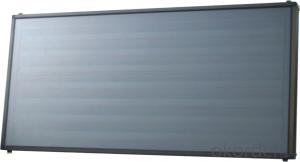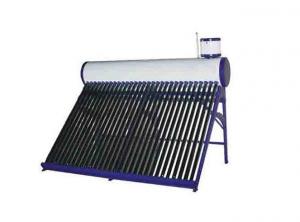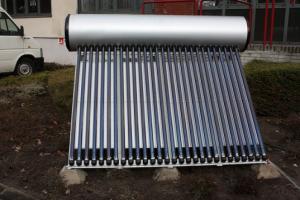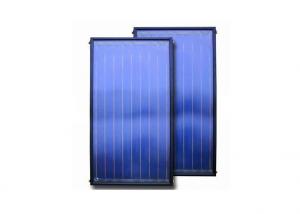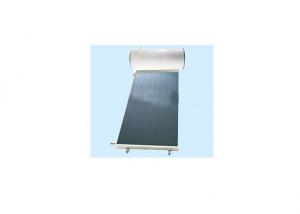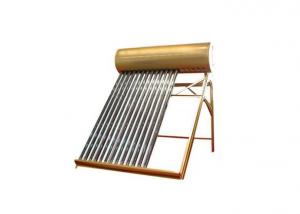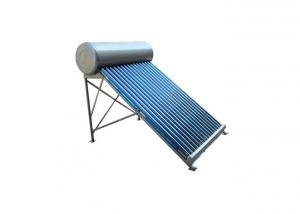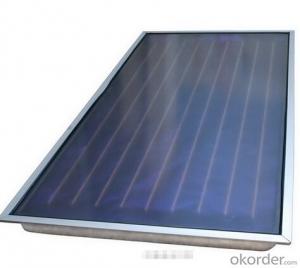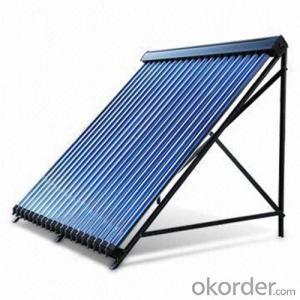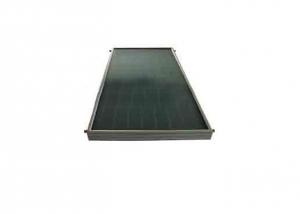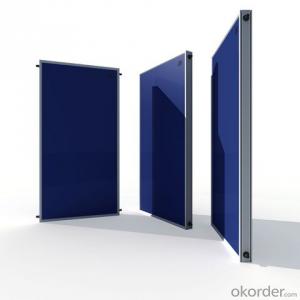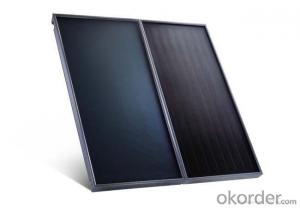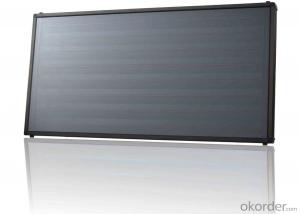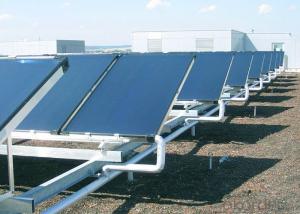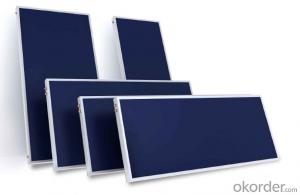Solar Energy Collector & Solar Thermal Absorber & Vacuum Solar Collector with Heat Pipe
- Loading Port:
- Shanghai
- Payment Terms:
- TT OR LC
- Min Order Qty:
- 500 pc
- Supply Capability:
- 10000 pc/month
OKorder Service Pledge
Quality Product, Order Online Tracking, Timely Delivery
OKorder Financial Service
Credit Rating, Credit Services, Credit Purchasing
You Might Also Like
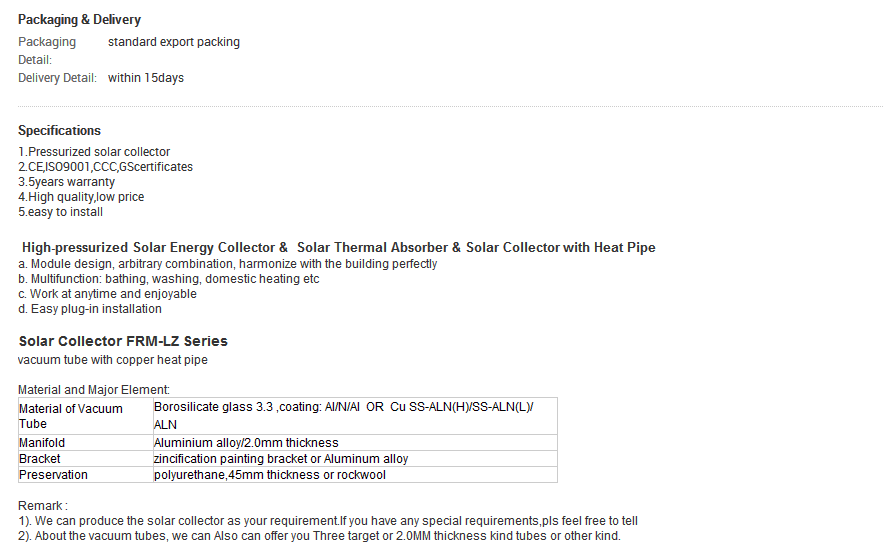
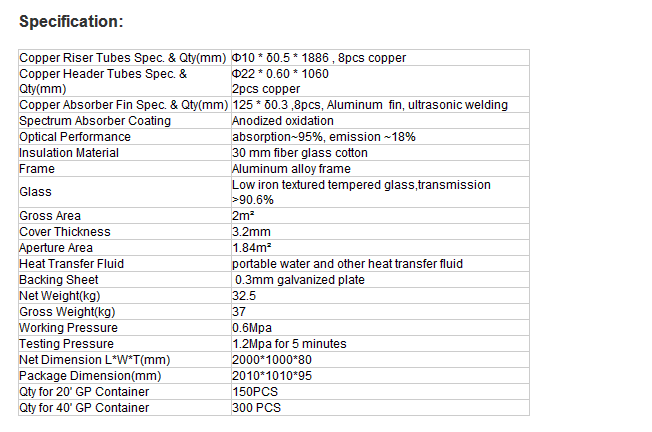
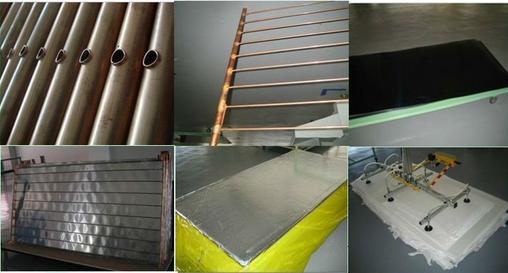
- Q:How do solar collectors compare to geothermal heating systems in terms of efficiency?
- Harnessing renewable energy for heating purposes can be achieved through the use of solar collectors and geothermal heating systems. Various factors can affect the efficiency of these methods. Solar collectors, also referred to as solar thermal systems, work by capturing the sun's energy and converting it into heat. They are typically installed on rooftops or open areas to ensure direct sunlight exposure. The efficiency of solar collectors is influenced by factors such as the angle and orientation of the panels, the amount of sunlight available, and the efficiency of the system's components. On the other hand, geothermal heating systems utilize the earth's constant temperature to provide heat. These systems extract heat from the ground through buried pipes, which is then used for heating purposes. Geothermal heating systems generally have higher efficiency compared to solar collectors due to the stable temperature of the earth throughout the year. This stability allows geothermal systems to consistently provide heat efficiently, regardless of the weather conditions. When considering overall efficiency, geothermal heating systems have an advantage over solar collectors. Geothermal systems typically have a coefficient of performance (COP) ranging from 3 to 5, meaning they can produce three to five units of heat energy for every unit of electrical energy consumed. In contrast, solar collectors have a lower COP, usually ranging from 1 to 2.5. This implies that solar collectors produce one to two and a half units of heat energy for every unit of electrical energy used. However, it is important to note that the efficiency of both solar collectors and geothermal heating systems can be influenced by factors such as system design, installation quality, and maintenance. Additionally, the availability and cost-effectiveness of these systems may vary depending on geographical location and local climate conditions. Ultimately, the suitability of either solar collectors or geothermal heating systems depends on factors like location, local climate, and individual requirements. Consulting with a professional is recommended to determine the most efficient and suitable renewable heating option for a specific situation.
- Q:How do solar collectors compare to traditional heating methods in terms of efficiency?
- Solar collectors are generally more efficient than traditional heating methods in terms of energy conversion. Traditional heating methods, such as fossil fuel-based systems, rely on burning fuels to generate heat, which leads to energy losses in the form of combustion byproducts. On the other hand, solar collectors harness the power of the sun to directly convert sunlight into heat energy, minimizing energy losses in the process. This makes solar collectors more efficient in terms of energy conversion. Moreover, solar collectors can also be more efficient in terms of cost. While traditional heating methods require ongoing fuel purchases, solar energy is free and abundant, which reduces long-term costs. Additionally, solar collectors require less maintenance compared to traditional heating systems, further lowering operational costs. It is worth noting that the efficiency of solar collectors can be influenced by various factors, such as the size and orientation of the collector, the level of insulation, and the climate conditions. However, advancements in solar technology have significantly improved the efficiency of solar collectors over the years, making them an increasingly viable and efficient alternative to traditional heating methods.
- Q:Can solar collectors be used for heating arenas?
- Yes, solar collectors can be used for heating arenas. Solar thermal systems can capture and store solar energy, converting it into heat that can be used for various purposes, including heating large spaces like arenas. By installing solar collectors on the arena's roof or nearby, the collected heat can be used to warm up the space, reducing the reliance on traditional heating systems and decreasing energy costs.
- Q:Solar collectors and tank water can not cycle what is the reason
- pipeline loop problem. If there are other piping behind the pump, pay attention to other pipeline valve opening and closing situation
- Q:Can solar collectors be used in areas with high levels of dust or dirt?
- Yes, solar collectors can be used in areas with high levels of dust or dirt. However, the efficiency of the solar collectors may be impacted as the accumulation of dust or dirt can reduce the amount of sunlight reaching the surface of the collectors. Regular cleaning and maintenance of the collectors may be necessary to ensure optimal performance in such areas.
- Q:Can solar collectors be used for agricultural purposes?
- Yes, solar collectors can be used for agricultural purposes. They can be used to power irrigation systems, provide heat for greenhouses, and generate electricity for farm operations. Solar collectors can help reduce the reliance on fossil fuels, lower energy costs, and contribute to sustainable farming practices.
- Q:Can solar collectors be used for heating warehouses?
- Yes, solar collectors can be used for heating warehouses. Solar thermal systems, such as flat plate or evacuated tube collectors, can capture and convert solar energy into heat. This heat can then be used for space heating in warehouses, providing a sustainable and cost-effective alternative to traditional heating methods.
- Q:Can solar collectors be used for generating electricity on stadiums?
- Yes, solar collectors can definitely be used for generating electricity on stadiums. In fact, many stadiums around the world are already utilizing solar energy as a way to generate electricity and reduce their environmental impact. Solar collectors, also known as solar panels or photovoltaic (PV) panels, convert sunlight into electricity through the photovoltaic effect. Stadiums are typically large structures with expansive rooftops and open spaces, making them ideal locations for installing solar collectors. These panels can be mounted on the rooftops, canopies, or even on specially designed structures around the stadium. By harnessing the abundant sunlight that falls on these surfaces, stadiums can generate clean and renewable electricity. The electricity generated by solar collectors on stadiums can be used for various purposes, including powering the stadium's lighting systems, scoreboards, sound systems, and other electrical equipment. Additionally, excess electricity generated can be fed back into the grid, offsetting the stadium's energy consumption and potentially allowing them to earn revenue through feed-in tariffs or net metering programs. Apart from the obvious environmental benefits, utilizing solar collectors in stadiums can also provide economic advantages. By generating their own electricity, stadiums can reduce their reliance on fossil fuels and lower their energy costs, saving significant amounts of money in the long run. Furthermore, stadiums can also benefit from government incentives and tax breaks that promote the adoption of renewable energy sources. In conclusion, solar collectors can indeed be used for generating electricity on stadiums. Their installation can help stadiums become more sustainable, reduce their carbon footprint, save on energy costs, and contribute to the overall transition towards clean and renewable energy sources.
- Q:Can solar collectors be used in areas with limited access to training facilities?
- Yes, solar collectors can be used in areas with limited access to training facilities. Solar collectors are relatively simple and straightforward to install and operate, requiring minimal training. In fact, many solar collector manufacturers provide detailed installation instructions and technical support to facilitate their use in remote or underserved areas. Additionally, with the availability of online resources and instructional materials, individuals in these areas can also educate themselves on the installation and maintenance of solar collectors, making it feasible to use them even without access to formal training facilities.
- Q:How do solar collectors impact cultural heritage?
- Solar collectors can have both positive and negative impacts on cultural heritage. On one hand, the installation of solar collectors can help reduce carbon emissions and promote sustainable energy practices, which align with the preservation of cultural heritage for future generations. Additionally, the use of solar collectors can contribute to the development of eco-friendly and energy-efficient technologies, which can have positive implications for the overall conservation of cultural sites. On the other hand, the installation of solar collectors may alter the visual integrity of historical buildings or landscapes, potentially affecting the aesthetic value and authenticity of cultural heritage. Therefore, it is important to strike a balance between renewable energy goals and the preservation of cultural heritage when implementing solar collector projects.
1. Manufacturer Overview |
|
|---|---|
| Location | |
| Year Established | |
| Annual Output Value | |
| Main Markets | |
| Company Certifications | |
2. Manufacturer Certificates |
|
|---|---|
| a) Certification Name | |
| Range | |
| Reference | |
| Validity Period | |
3. Manufacturer Capability |
|
|---|---|
| a)Trade Capacity | |
| Nearest Port | |
| Export Percentage | |
| No.of Employees in Trade Department | |
| Language Spoken: | |
| b)Factory Information | |
| Factory Size: | |
| No. of Production Lines | |
| Contract Manufacturing | |
| Product Price Range | |
Send your message to us
Solar Energy Collector & Solar Thermal Absorber & Vacuum Solar Collector with Heat Pipe
- Loading Port:
- Shanghai
- Payment Terms:
- TT OR LC
- Min Order Qty:
- 500 pc
- Supply Capability:
- 10000 pc/month
OKorder Service Pledge
Quality Product, Order Online Tracking, Timely Delivery
OKorder Financial Service
Credit Rating, Credit Services, Credit Purchasing
Similar products
New products
Hot products
Hot Searches
